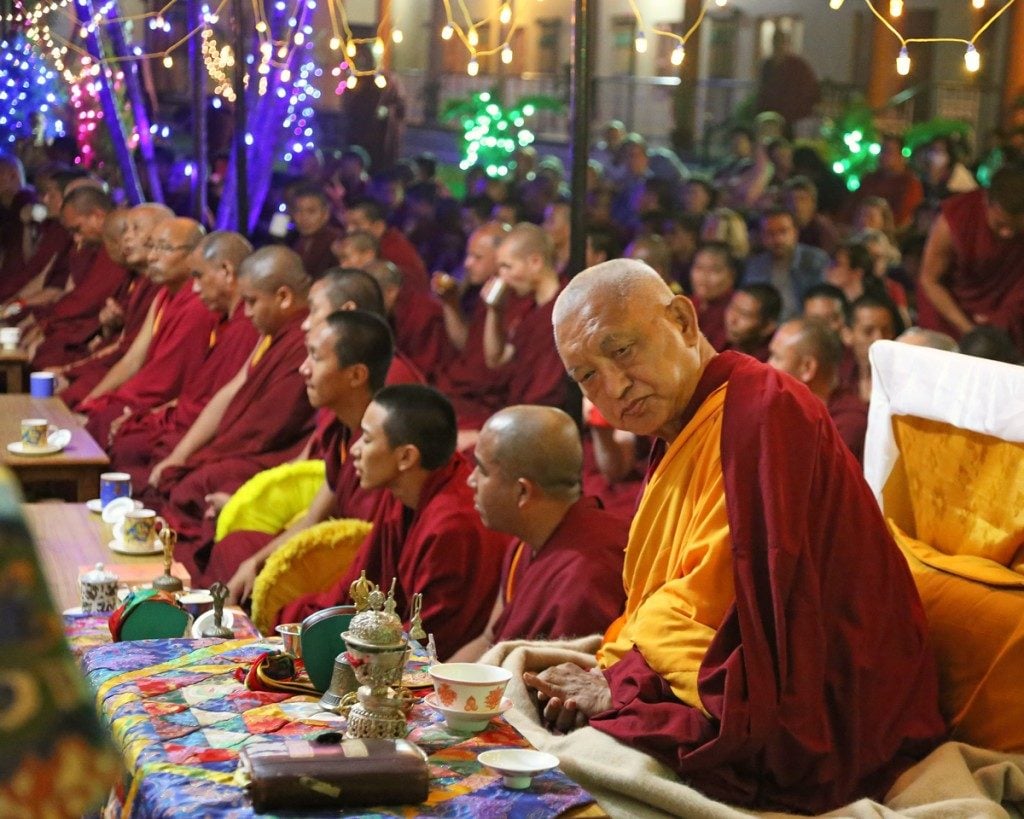Vasudh?r?�s name is a melodious Sanskrit phrase that translates to �stream of gems�. Thinking of Her as the �stream of gems� Tara paints a picture of abundant wealth and prosperity. Why is Prosperity and Wealth so vital to Buddhist...
Vasudh?r?�s name is a melodious Sanskrit phrase that translates to �stream of gems�. Thinking of Her as the �stream of gems� Tara paints a picture of abundant wealth and prosperity. Why is Prosperity and Wealth so vital to Buddhist practice?
 Vasudhara in her most popular form in Tibet, with two arms, Golden Yellow holding a sheef of corn. She is an aspect of Tara, called Yellow Tara (11th Tara in the Nyingma 21 Taras Lineage), and she is none other than Mother Earth�s Enlightened Form, who controls the ten Guardians of the World.
Vasudhara in her most popular form in Tibet, with two arms, Golden Yellow holding a sheef of corn. She is an aspect of Tara, called Yellow Tara (11th Tara in the Nyingma 21 Taras Lineage), and she is none other than Mother Earth�s Enlightened Form, who controls the ten Guardians of the World.
Vasudh?r?: The Buddhist Goddess of Wealth and Prosperity
The goal of stable livelihood for the lay Buddhist is a noble one, enabling Buddhists to support the dedicated monastic community, and providing stability in life that gives the practitioner the ability to help others. Golden Vasudhara Tara is not about greedily asking for more, and more, but rather about attaining more so that we can give and give. The poison of greed is overcome by generosity ďż˝ which is only possible if we have a stable livelihood.
Vasudh?r? embodies these exact ideals, standing tall as the Buddhist Goddess of wealth, prosperity, and abundance. A popular form of Yellow Tara, she is none other than Mother Earth herself who nurtures, sustains, and enriches.
As described in this Sakya praise:
�Bhagavani, source of all wonders, Vasudhara, goddess of splendour and fortune, bestower of auspicious mental desires; homage to the Goddess Wish-fulfilling Wheel.�
 Vasudhara in her six-armed, one face form, the most popular form in Nepal. One of her hands still holds the corn or grain stalk, representing the bounty of the earth.
Vasudhara in her six-armed, one face form, the most popular form in Nepal. One of her hands still holds the corn or grain stalk, representing the bounty of the earth.
ďż˝
Names of Vasudhara Around the World
| Vasudh?r?ďż˝ |
| Vasundhar? |
| ???????????? Wylie: nor rgyun maor Drolma Sermo |
| Wathondare (????????) Wathondara (????????) |
| Neang Konghing (?????????) Preah Thoroni (????????) Preah Mae Thoroni (???????????) |
| Vasundhar? (??????????) Mae Phra Thorani (??????????) Nang Thorani (???????) |
| (Traditional) ???? (Simplified) ???? (Pinyin: Ch�sh� P�s�) (Traditional) ???? (Simplified) ???? (Pinyin: C�iyu�n Ti?nm?) |
| Gaia |
| ??????????? (romaji: Jise Bosatsu) |
| ???? (RR: Jije Bosal) |
| Basudhala |
| Tr� Th? B? T�t |
| Terra |
Vasudhara, the Witness of Buddha under the Bodhi Tree
Vasudhara is also known as Prithvi, or P?thv? M?t? (�Mother Earth�) who protected Gautama Buddha and was his witness before Mara. Prithvi appears in�Early Buddhism in the P?li Canon, dispelling the temptation figure Mara by attesting to Gautama Buddha�s worthiness to attain enlightenment.
ďż˝
 A relief in Bangkok depicting Vasudhara serving as witness to Buddha�s perfect accomplishments and symbolically sweeping away the Maras with a flood of water flowing from her long hair. In the Sutra story, Buddha touches the earth to be his witness before Mara, the Tempter, and the earth, Vasudhara, shakes in all directions.
A relief in Bangkok depicting Vasudhara serving as witness to Buddha�s perfect accomplishments and symbolically sweeping away the Maras with a flood of water flowing from her long hair. In the Sutra story, Buddha touches the earth to be his witness before Mara, the Tempter, and the earth, Vasudhara, shakes in all directions.
ďż˝
This is the most famous pose of Gautama Buddha � with his hand touching the earth, the�Bhumisparsha Mudra.� Bhumi means earth Mother, and through the next few decades of Buddha�s life, he would remain close to Mother Earth and dwelled mostly in the forests of Mother Tara [Green Tara is Tara of the Khaidira Forest).
In his moment of Realizations under the Bodhi Tree, Buddha calls on Mother Earth, none other than Vasudhara Prithvi Tara, as his witness. Mara, the great tempter who assailed Buddha with offers of wealth and power, was silenced by Vasudhara Prithvi�s witness [Source Mah?vastu (Sanskrit for �Great Event� or �Great Story� Sutra]:
He now let his right hand slide over his entire body and then gracefully tapped on the
earth. He then spoke this verse:
�This earth supports all beings;
She is impartial and unbiased toward all, whether moving or still.
She is my witness that I speak no lies;
So may she bear my witness.ďż˝
As soon as the Bodhisattva touched this great earth, Vasudhara shook in six different ways. She quivered, trembled, and quaked, and she boomed, thundered, and roared.
More on Prthvi Mata Vasudhara on Buddha Weekly>>ďż˝
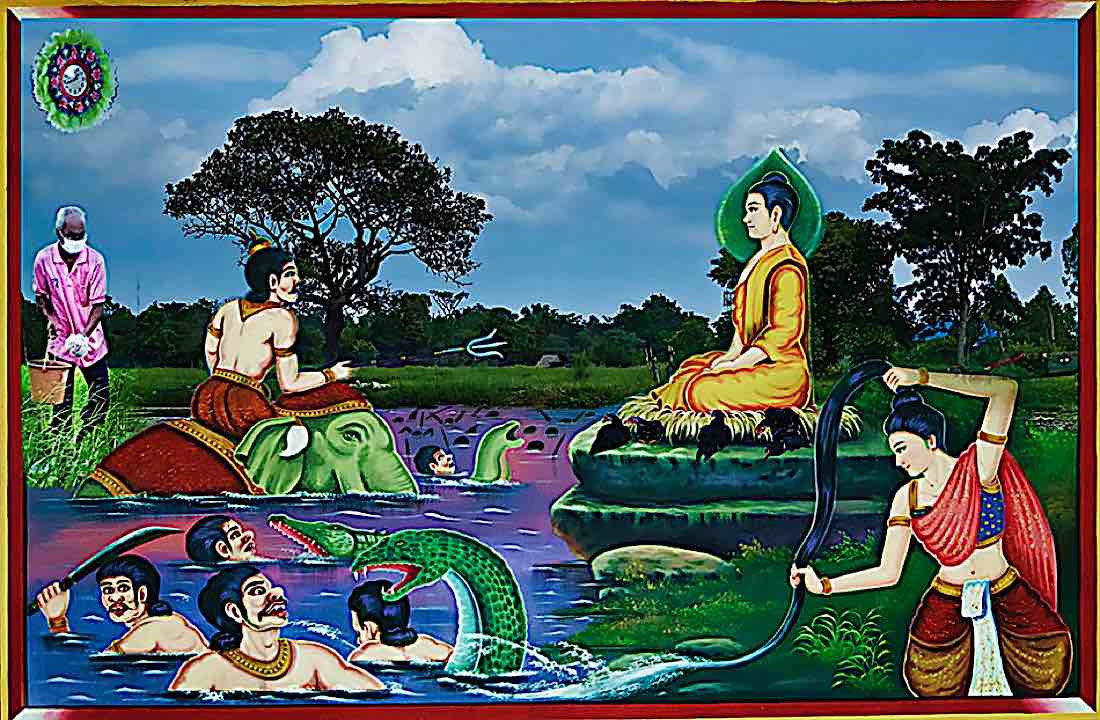 Earth Mother Phra Mae Thorani bears witness to Buddha�s merits.
Earth Mother Phra Mae Thorani bears witness to Buddha�s merits.
ďż˝
In the temple murals of Southeast Asia, Vasudhara Phra Mae Thorani is often portrayed alongside Buddha, who is in the pose referred to as �invoking the earth as witness�. The boundless streams of water emerging from her dazzling hair cleanse the ground of Mara�s armies, embodying the bodhisattva�s profound act of selflessness, often referred to as�d?na param?.
ďż˝
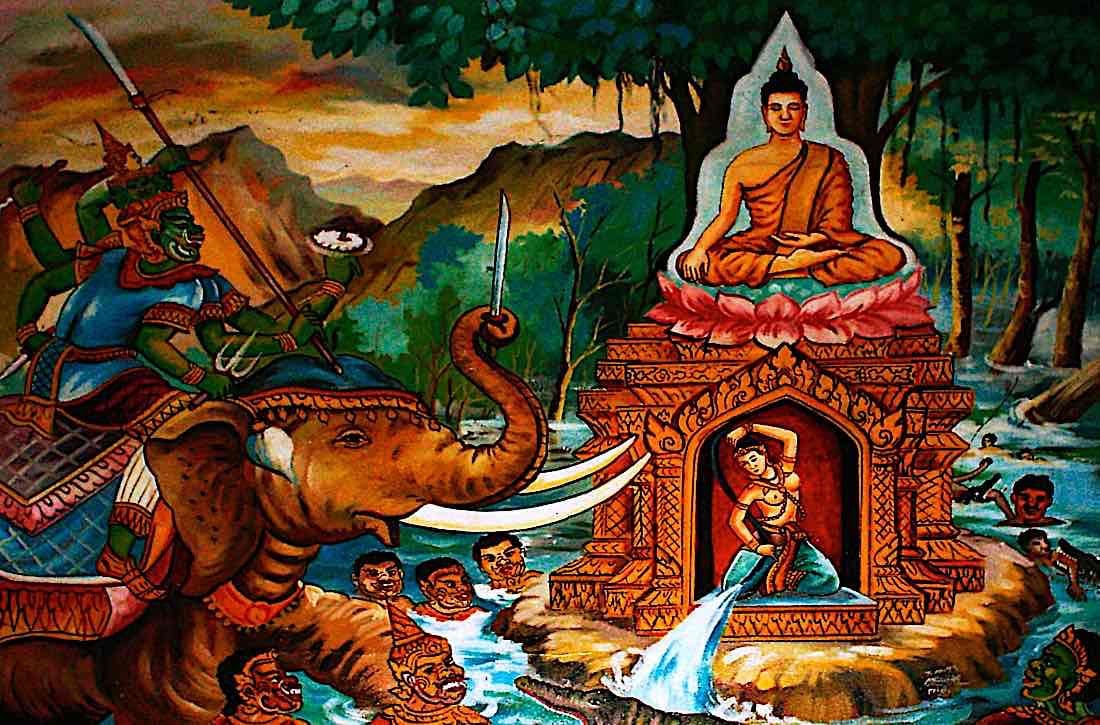 Buddha, under the Bodhi Tree, is assailed by Mara�s hordes of demons. When Buddha touches the Earth, who is Vasudhara, She becomes his witness. In legend, Her power is so great over the Maras, that water surges in a flood from her long hair and sweeps away the Maras. In Sutra, her testimony takes the form of the earth shaking in all directions.
Buddha, under the Bodhi Tree, is assailed by Mara�s hordes of demons. When Buddha touches the Earth, who is Vasudhara, She becomes his witness. In legend, Her power is so great over the Maras, that water surges in a flood from her long hair and sweeps away the Maras. In Sutra, her testimony takes the form of the earth shaking in all directions.
Transforming the Poisons with Vasudhara
If you�re considering walking the path laid out by Vasudh?r?, you�re about to engage with a truly transformative force. Known for her bestowment of material and spiritual wealth, this enlightened deity could be your guide towards a life of abundance, prosperity, and spiritual enlightenment.
Vasudh?r?�s practice isn�t a mundane wealth practice. You may originally see her as the deliverer of riches, yet her teachings pivot around generosity and charity � and She fully expects you, for the sake of your own positive merit and karma, to overcome your own greed by practicing as a Bodhisattva, with a mission to help others.
ďż˝
 �Tara�s green hands cradling the Earth, which is none other than a manifestation of Tara herself, as Yellow Tara or Vasudhara. (Composite feature image from Buddha Weekly)
�Tara�s green hands cradling the Earth, which is none other than a manifestation of Tara herself, as Yellow Tara or Vasudhara. (Composite feature image from Buddha Weekly)
ďż˝
As Mother Earth, She Can be Fierce
As Mother Earth, Vasudahara is a great provider, but she can be wrathful as well. For this reason, for example, the 11th Tara, who is Vasudhara, is semi-wrathful, gold-ish red yellow . The 11th Tara specifically controls the entire assembly of 10 Earthly Protectors (See section below), and as such, she encompasses some ferocity.
How did Vasudhara show that she witnessed Buddha�s benevolence? She shook the world in six different ways. Just as Mother Earth is our wonderful motherly provider, she has a wrathful side as well. To practice Vasudhara, we undertake to likewise protect Mother Earth and all sentient beings on Her. In other words, environmental activism is another way we make offerings to Vasudhara, together with generosity.

The Power of Her Mantra
Vasudhara�s mantra, whether as her heart mantra, or as Yellow Tara Vasudhara (the 11th of 21 Taras) is profoundly effective, and results-oriented. But, it is also powerfully transformative in your life.
Vasudh?r?: �Stream of gems,� a�shining beacon of wealth, prosperity, and enlightenment, and a�guiding light towards selfless giving and boundless loving. Are you ready to embrace her wisdom?
Her most popular mantra is:
Om Sri Vasudhara Ratna Nidhana Kashetri Svaha
The meaning of the mantra is:
Om ďż˝ Praising the Body, Speach andďż˝ Mind of Vasudhara
Sri � is Sanskrit for �Abundance�
Vasudhara � the Name of the Goddess which means �Endless Stream of Jewels�
Ratna ďż˝ indicates she belongs to the Ratna Family ďż˝ in this context she emanates from Ratnasmbhava and is also the Co-Equal Wisdom Partner of Yellow Jambhala, the God of Wealth, who also emanates from Ratnasambhava
Nidhana�� means �treasure� according to� Mah?praj�?p?ramit???stra (chapter 41.� � Also translates as �treasury of Dharma Jewel� according to the Gaganaga�japarip?cch?: the eighth chapter of the Mah?sa?nip?a.
Kashetri � �to cultivate� in this context, as in to �cultivate the treasure� which can be a spiritual or material treasure.
Svaha � �well said� and �so be it� or� �thus it is�
The entire mantra, translates contextually:
I prostrate and praise the Goddess of Abundance Vasudhara of the Jewel Family, who helps us cultivate material and spiritual wisdom treasures, so be it.
Short Mantra
O? Vasudh?r?yai Sv?h?.
Vasudhara Long Dharani from Sutra
(See the full Sutra below.)
Buddha transmitted the long Dharani of Vasudhara to Sucanda (the Layman, see story in next section) to help him attain success and wealth for the benefit of the Dharma and sentient beings, and instructed Sucana and Ananda to transmit and teach the Dharani widely:
tadyath? | o? sur?pe bhadre bhadravati a?gale ma?gale ma?galavati ale acale acala-bale udgh?tini udbhedini ?asyavati dhanavati dh?nyavati ?r?mati prabhavati amale vimale nirmale rurume sur?pe sur?pavimale vimale cale arcanaste atanaste vitanaste vi?vake?i vi?vani?i a?kure ma?kure prabha?kure virame vidhame ririme dhidhime dhudhume khakhame tatare tara tara t?ra t?ra vajre vajre vajropame ?ake ?ake ?hake ?hake ukke bukke ?hake ?harake ?vartani var?a?i (ni)?(p)?dani vajradh?ra-s?gara-nirgho?a? tath?gata? anusmara smara smara sarva-tath?gata-satyam-anusmara dharma-satyam-anusmara sa?gha-satyam-anusmara data data p?ra p?ra p?raya p?raya p?ra?i bhara bhara?i amale suma?gale ??ntamati ?ubhamati ma?galabha?i mah?mati bhadravati prabhavati sucandramati ?gacch?gaccha samayam-anusmara sv?h? | avara?im-anusmara sv?h? | prabhavam-anusmara sv?h? | d?dim-anusmara sv?h? | tejom-anusmara sv?h? | vijayam-anusmara sv?h? | h?dayam-anusmara sv?h? | sarva-sattva-vijayam-anusmara sv?h? |
 Vasudhara in her 2-armed form. Even when she has two hands, in this form she still has the treasure vase and stalk of grain in her han, with her other hand in the mudra of giving.
Vasudhara in her 2-armed form. Even when she has two hands, in this form she still has the treasure vase and stalk of grain in her han, with her other hand in the mudra of giving.
The Benefits of the Dharani
According to the Buddha, the benefits of the Dharani are:
O noble son, through the power of this dh?ra?? no human will ever harm you. No yak?a will ever harm you. No r?k?asa will ever harm you. No preta will ever harm you. No pi??ca will ever harm you. No bh?ta will ever harm you. No kumbh???a will ever harm you. No apasm?ra will ever harm you. No ost?raka will ever harm you. No ka?ap?tana will ever harm you. No deva will ever harm you. No asura will ever harm you. No demons, whether they feed on feces, urine, blood, flesh, pus, grease, marrow, snot, effluent, or breath, nor spirits who are able to possess you, will ever harm you!ďż˝
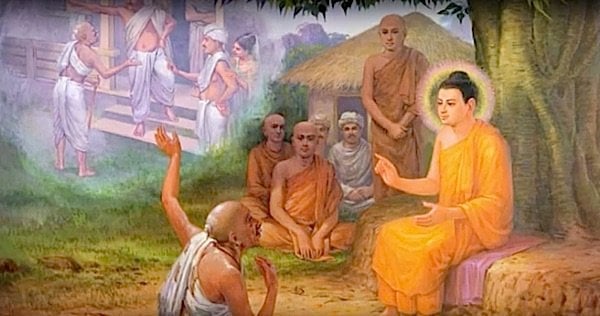 Shakyamuni Buddha teaches a layman. In the Sutra story of Sucanda, Buddha gives him the Dharani of Vasudhara to help �fill up his graineries� so that he can feed his family, village and the Sangha community.
Shakyamuni Buddha teaches a layman. In the Sutra story of Sucanda, Buddha gives him the Dharani of Vasudhara to help �fill up his graineries� so that he can feed his family, village and the Sangha community.
ďż˝
The Story of the Layman Sucandra and Vasudh?r?
In the Sutra of The Vasudhara Dharani (in full below.) , we find the well-known story the humbleďż˝ Sucandra, who lived a life of hardship, barely supporting a large family. He was desperate to find a way to feed his family and village, and perhaps have enough to share with others.
Desperate, he went to Shakyamuni, the historical Buddha himself. He asked:
�Blessed One, although I am very poor, I have to take care of many sons, daughters and dependents. Therefore, I would like to request the Blessed One for a Dharma teaching that makes the poor wealthy and restores the ill to good health, that grants us wealth and grain and treasures and vaults of treasure, that makes us pleasant, charming, beautiful and lordly, that attracts patrons without needing to ask, and that grants jewels, gold, riches, stores of grain, and vaults of treasure, as well as gems, pearls, diamonds, lapis lazuli, conch shells, crystals, coral, gold and silver without needing to search or beg, and that renders one�s partner and dependents stable and secure.�
He followed the Buddha�s advice, and Sucandra saw an almost immediate change in his fortunes. His prosperity became so noticeable that it raised the curiosity of Ananda, a disciple and attendant of the Buddha, who then asked Shakyamuni about the source of Sucandra�s quick fortune.
Buddha taught him the Vasudh?r?�s Dharani and Mantra, and advised Ananda to practice it himself and share it with others, for the benefit of many. This began a cycle of receiving and giving, spreading Vasudh?r?�s abundance practice to many followers.
Buddha said:
?nanda, therefore, you too should receive the Vasudh?r? Dh?ra??, keep it in mind, recite it, teach it, memorize it, master it, and explain it to others in detail. This will benefit many individuals. It will bring them happiness. It will bring love and compassion to the world, and it will bring benefit and happiness to hosts of beings, gods and humans alike.
This legend carries a profound message. Vasudh?r? becomes a symbol of both the joy of receiving and the power in sharing, encouraging us to become conduits of her benevolence. We learn, through Sucandra�s success, the power of generosity, charity, and the sharing of good fortune. The practice of Vasudh?r?�s Dharani is not simply about personal gain, it is about prospering so that others may also prosper; the true essence of the Buddhist ideal of interconnectedness and the Bodhisattva mission to help all sentient beings.
It is also about honouring Vasudhara as Mother Earth. Holding a close relationship to Mother Earth is for the benefit of all beings.
ďż˝
 Yellow Jambhala is the co-equal compassion aspect of the auspicious activities of the earth, an emanation or Ratnsambhava, while Vasudhara is his Wisdom partner. This is symbolized by them together. Art from Himalayanart.org. For a feature on Yellow Jambhala, see>>
Yellow Jambhala is the co-equal compassion aspect of the auspicious activities of the earth, an emanation or Ratnsambhava, while Vasudhara is his Wisdom partner. This is symbolized by them together. Art from Himalayanart.org. For a feature on Yellow Jambhala, see>>
ďż˝
The Meaning and Symbolism of Vasudh?r?: The Stream of Gems
There are three main forms of Vasudhara, although any form of Mother Earth, from Prithvi to Gaia can be considered aspects of Vasudhara, and ultimately Tara.
ďż˝
 �In this composition there are twelve figures. Eight of the figures are wealth deities. At the top center is Shakyamuni Buddha with Green and White Tara seated on the left and right. At the bottom right corner there is a very small kneeling donor figure. Directly above the central Vasudhara is Yellow Jambhala. To the left of that is White Jambhala. To the right is red Kurukulla. Below that on the left is Vaishravana Riding a Lion. On the right is White Sita Shadbhuja Mahakala.� Jeff Watt 12-2013 (Himalayanart.org)
�In this composition there are twelve figures. Eight of the figures are wealth deities. At the top center is Shakyamuni Buddha with Green and White Tara seated on the left and right. At the bottom right corner there is a very small kneeling donor figure. Directly above the central Vasudhara is Yellow Jambhala. To the left of that is White Jambhala. To the right is red Kurukulla. Below that on the left is Vaishravana Riding a Lion. On the right is White Sita Shadbhuja Mahakala.� Jeff Watt 12-2013 (Himalayanart.org)
ďż˝
Two-Armed Vasudhara, Most Popular in Tibet
�Vasudhara, with one face and two hands. The right [hand] in the gesture of supreme generosity and the left holds tufts of rice and a vase, showering down various jewels. Having jewel ornaments and garments of silk. Completely surrounded by friendly beings. Seated in the vajrasana [posture].� (Konchog Lhundrub, 1497-1557. From the�One Hundred Methods of Accomplishment).
 Vasudhara with one face and six arms. Himalayan Art
Vasudhara with one face and six arms. Himalayan Art
Six-Armed Vasudhara, Most Popular in Nepal
�Vasudhara, yellow, with one face and six hands; in a manner happily seated at play. The first right hand is in a gesture of supreme generosity, the second �raining jewels,� the third with the hand in a gesture accompanying singing. The first left holds an abundant vase, the second a sheaf of grain, the third [holds] the Prajnaparamita text; adorned with all jewel ornaments.�
(This form of Vasudhara arises from the Togpa Chungwa and the Vajravali text of Abhayakaragupta). [Source: HimalayanArt.Org]
The Third Form, is the most commonly practiced, mostly because most Vajrayana and many Mahayana Buddhists practice the 21 Taras Daily. The Third form, in the Atisha and Nyingma lineages is the 11th Tara.
ďż˝
 Golden Yellow Tara, one of the 21 Taras in the Atish and Nyingma lineages. In Atisha lineage she holds a treasure vase in her right hand (as shown) and in the Nyingma lineage the vase is on the lotus flower over her left shoulder (not shown). Art by the amazing Lasha Mutual, found here>>
Golden Yellow Tara, one of the 21 Taras in the Atish and Nyingma lineages. In Atisha lineage she holds a treasure vase in her right hand (as shown) and in the Nyingma lineage the vase is on the lotus flower over her left shoulder (not shown). Art by the amazing Lasha Mutual, found here>>
ďż˝
Vasudhara as the 11th Tara: Tara Who Bestows Wealth
Vasudhara is the 11th of the 21 Taras (Atisha Lineage), a sparkling gold goddess (often depicted as Orange, or described as �yellow-red�) who helps us accumulate wealth for altruistic purposes. Her Names are Tara Who Bestows Wealth (Drolma Nor Terma) or Tara Who Eliminates Poverty�in the Atisha lineage. Below is her Praise (from the 21 Taras), her attributes, visualization and her mantra. In the Atisha lineage she is gold orange and holds a gold or yellow vase.� Similarly, in the Nyingma Lineage of 21 Taras she has a lotus flower in her left hand with the gold or yellow treasure vase on top of the Lotus.
Note: Some lineages attribute the 3rd Tara, notably in the Nyingma lineages, as Vasudhara. This is also correct. Yellow or Gold Tara emanates in multiple forms. The 11th Tara is the chief among these, as she controls the 10 Earth Guardians. In Surya Gupta, where the visualizations are completely different, She is the 12th, Tara Who brings prosperity.
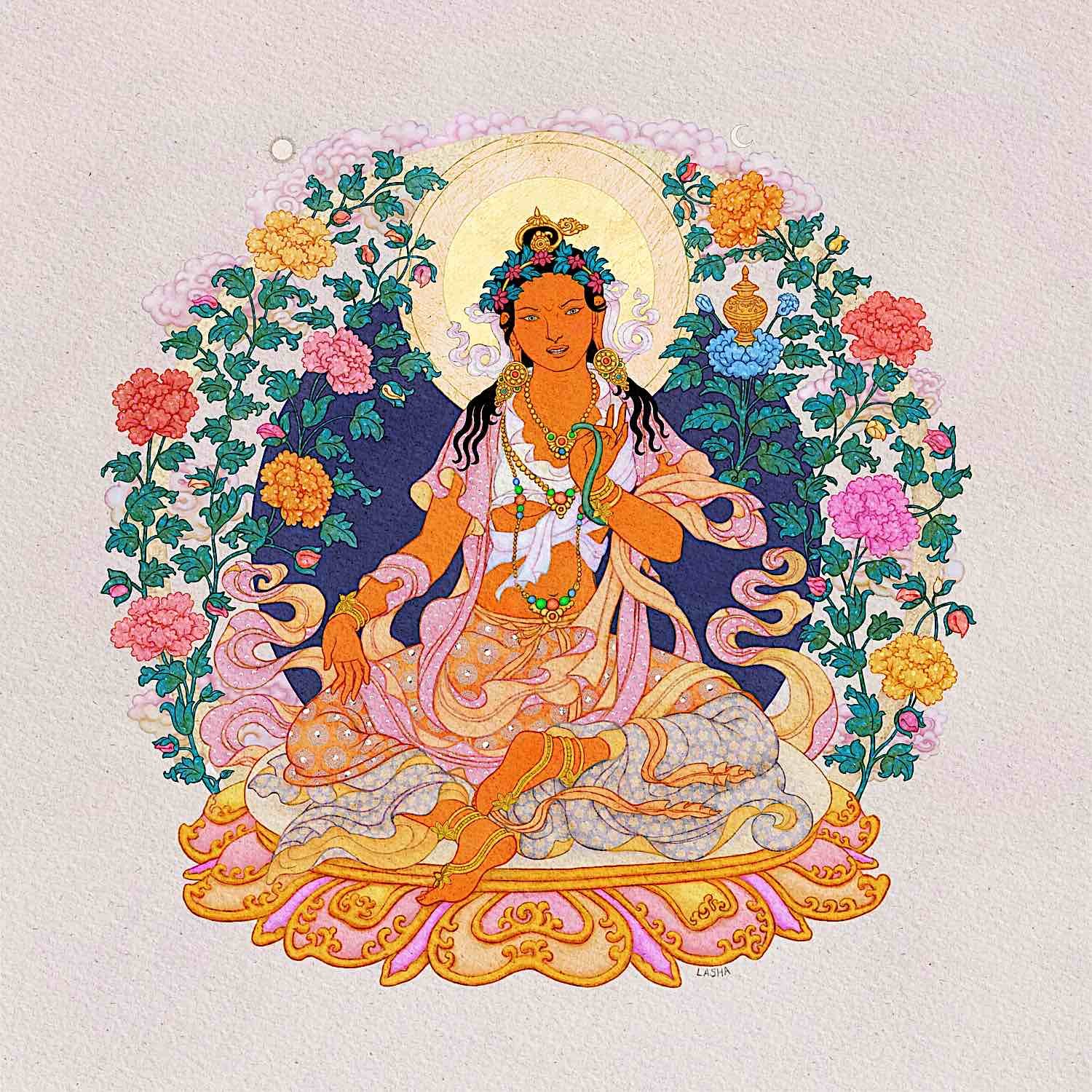 Tara 11 is Tara who bestows wealth, called Drolma Nor Terma, who is Vasudhara. She is orange with a Treasure Vase, and her acitivy is wealth, removing the suffering of poverty. She controls the 10 Guardians of the World.
Tara 11 is Tara who bestows wealth, called Drolma Nor Terma, who is Vasudhara. She is orange with a Treasure Vase, and her acitivy is wealth, removing the suffering of poverty. She controls the 10 Guardians of the World.
ďż˝
Her power over affluence, wealth is because she is Vasudhara, Goddess of the Earth, who controls the entire assembly of ten guardians and protectors, who include Jambhala / Vaisravana, Wisdom King of the North and the Enlightened God of Wealth and Good Fortune. (Dikapalas in Sanskrit)
Thus, her praise reveals her power over the ten guardians:
Homage! She able to summon
All earth-guardiansďż˝ assembly!
Shaking, frowning, with her HUM sign
Saving from every misfortune!
Sanskrit:
Namah samanta bhu pala
patalakarshana kshame
chalat bhrku ti hum kara
sarvapada vimoch ani
Color: Yellow-red ďż˝ sparkling goldďż˝ (In Surya Gupta, however, she is black, for a more wrathful form of activity. In Surya Gupta, her name is Tara Who Summons All Beings and Dispels Misfortune.)
Seed Syllable (light emits from this syllable at her heart): Hum (Sanskrit) Hung (Tibetan)
Vase: Yellow
Nectar: affluence, auspiciousness, spiritual and material wealth, overcomes all poverty.
Activity: Attracting and affluence.
Specialty: Accumulating wealth and overcoming poverty, through the controlling activity as controller of the 10 earth-guardians.
Visualization: On the eleventh petal is Tara Who Eradicates Poverty (Ponpa Selma), red-yellow in color, like refined gold. She holds a yellow flask containing nectar whose function is to eliminate poverty.
Atisha-Lineage Mantra:
OM TARE TUTTARE TURE VASUDHARINI SVAHA
In the Nyingma lineage the mantra is:
OM TARE TUTTARE TURE MAMA BASU PUSHTIM KURU SVAHA
In the Surya Gupta lineage, the mantra is almost the same as Atisha-lineage, although she appears as a fierce black Tara:
OM TARE TUTTARE TURE VASU DHA RE SVAHA
Lama Zopa commentary from his book The Power of Mantra Vital Practices for Transformation[1] (Available on Amazon>>): �This is the Tara you use when you make a Tara wealth vase for prosperity. When you put a statue or drawing of this Tara in a wealth vase, to eliminate either your poverty or that of others, you take strong refuge and recite this mantra in front of the vase.�
ďż˝
 Gold or orange 2-armed Vasudhara depicted standing with her stem of grain, and wish-granting jewel. She stands on a mountain of jewels, and her name means �stream of jewels.�
Gold or orange 2-armed Vasudhara depicted standing with her stem of grain, and wish-granting jewel. She stands on a mountain of jewels, and her name means �stream of jewels.�
Sutra of Vasudhara Dharini: Spoken by Gautama Buddha
???ďż˝????????????????????????????????????????????????ďż˝?
The Noble Vasudh?r? Dh?ra??
from the Words of the Buddha
ďż˝
??????????????ďż˝????????????????????????????????
gyagar kďż˝ du arya vasudhara nama dhara ni
In the language of India: ?rya Vasudh?r?-n?ma-dh?ra??
???????????ďż˝??????????????????????????????????????
b�k� du pakpa nor gyi gy�n chejaw� zung
In the language of Tibet: Pakpa nor gyi gy�n chejaw� zung (�phags pa nor gyi rgyun ces bya ba�i gzungs)
In the English language: The �Stream of Wealth� Incantation
ďż˝
?????????????????????????????????????????????????ďż˝?
sangye dang changchub sempa tamchďż˝ la chaktsal lo
Homage to all the buddhas and bodhisattvas!
ďż˝
?????????????????????????????????ďż˝??????????????????????????????????????????????????????????ďż˝????????????????????????????????????????????????????????ďż˝????????????????????????????????????????????????????????????????????????????????????????????????????????
dik� dak gi t�pa d� chik na chomdend� kaushambi na tserma chen zhejaw� nak chenpo na gelong ngabgya tsam gyi gelong gi gend�n chenpo dang changchub sempa sempa chenpo sangye kyi y�nten tamch� dang denpa rabtu mangpo dang tab chik tu zhuk t�
Thus I have heard: At one time the Blessed One was dwelling near Kau??mb? in the great forest called Ka??aka, together with a great assembly of about five hundred monks and a vast assembly of bodhisattva mah?sattvas who had all the qualities of the buddhas.
???????????????????????????????????????ďż˝??????????????????????????????ďż˝??????????????????ďż˝???????????????ďż˝?????????ďż˝???????????ďż˝??????????????????????ďż˝?????????????????????????????
dďż˝ tsďż˝ kaushambi drongkhyer chenpo na khyimdak dawa zangpo zhejawa wangpo nyewar zhiwa yi nyewar zhiwa bu po dang bumo mangwa zami mangpo dang denpa dďż˝ ching cher depa zhik nepa dďż˝
At that time there lived in the great city of Kau??mb? a householder by the name of Sucandra whose senses were composed and whose mind was at ease. He had many faithful and devoted sons and daughters as well as dependents.
???????????????????????????????????????ďż˝??????????????????????????????????????????ďż˝??????????????????????????????????????????????????????ďż˝?
chomdendďż˝ gala ba der song tďż˝ chin nďż˝ chomdendďż˝ kyi zhab lago bďż˝ chaktsal tďż˝ len bumtrak dumar korwa jďż˝ nďż˝ chok chik tu duk go
Sucandra approached the Blessed One, paid his respect by touching his head to the feet of the Blessed One, and circumambulated the Blessed One many hundred thousands of times.
???????????????????????????????????????????????????????????????????????????????ďż˝?
chok chik tu duk nďż˝ khyimdak dawa zangpďż˝ chomdendďż˝ la dikďż˝ chďż˝ sol to
Finally, he sat down to one side. While seated there, Sucandra the householder said the following to the Blessed One:
??????????????????????????????????????ďż˝???????????????????????????????????ďż˝??????????????????????????????????????????????????????????????????????????????????????????????????ďż˝?
galtďż˝ zhďż˝ nďż˝ zhuwa lungtenpďż˝ ledu chomdendďż˝ kyi dak la kab chďż˝ na chomdendďż˝ dezhin shekpa drachompa yangdakpar dzokpďż˝ sangye la dak chok gazhik zhu lak so
�I would like to ask the Blessed One, the Tath?gata, the Arhat, the complete and perfect Buddha a question, in case the Blessed One could afford the time to answer it.�
??????????????????????ďż˝????????????????????????????????????????????????????????????????ďż˝?
dekďż˝ chďż˝ solwa dang chomdendďż˝ kyi khyimdak dawa zangpo la dikďż˝ chďż˝ katsal to
The Blessed One then replied to Sucandra the householder as follows:
????????ďż˝??????????????????????????????????ďż˝?????????????????????????????????????????????????????????????????????????ďż˝?
khyimdak khy� chi dang chi d�pa dri shik dang khy� kyi jitar drip� driwa lungtenp� ng� khy� kyi sem rangpar ja o
�Householder, please ask whatever you wish. I shall answer your question and so put your concerns to rest.�
?????????????????????????ďż˝?????????????????????????????????????????????????????????ďż˝??????????????????????????????????????????????????????????????ďż˝?
dekďż˝ chďż˝ katsal pa dang khyimdak dawa zangpďż˝ chomdendďż˝ la lek so zhďż˝ sol tďż˝ chomdendďż˝ kyi tar nyen nďż˝ chomdendďż˝ la dikďż˝ chďż˝ sol to
To these words of the Blessed One Sucandra the householder responded, �Very well, Blessed One,� and asked the Blessed One the following:
?????????????ďż˝??????????????ďż˝?????????????????????????????????????????????????????????????????????ďż˝???????????????????????????????????????????????????
chomdendďż˝ rik kyi bu am rik kyi bumo ulpor gyurpa lďż˝ jitar ulwa machipar gyur zhing dro nďż˝ kyi teb na yang dro nďż˝ machipar gyurpa lak
�Blessed One, how can a son or daughter of noble family who suffers from poverty free themselves from their poverty? Likewise, if they suffer from disease, how can they free themselves from their disease?�
????????????????????????????????????????????????????????????????????????????????????ďż˝?
denďż˝ chomdendďż˝ kyi khyen zhindu khyimdak dawa zangpo la dikďż˝ chďż˝ katsal to
The Blessed One then understood, and he said to Sucandra the householder:
????????ďż˝?????????????????????????????????????ďż˝?????????????????????????
khyimdak khy� chi chir ulp� d�ndu dri dek� ch� katsal pa dang
�Householder, why do you ask me about poverty?�
?????????????????????????????????????????????????????????ďż˝?
chomdendďż˝ la khyimdak dawa zangpďż˝ dikďż˝ chďż˝ sol to
Sucandra the householder replied to the Blessed One:
?????????????ďż˝???????????????????????ďż˝???????????????ďż˝????????????????????ďż˝?????????????????????????????ďż˝????????????ďż˝?????????????????????????????????????????????????????????????ďż˝?????????????????????????????????????????????????????ďż˝????????ďż˝?????????ďż˝?????????ďż˝????????????????????????????????????ďż˝???????????ďż˝??????????????????ďż˝????????????????????????ďż˝????????????????????????ďż˝??????????????????????????????ďż˝??????????ďż˝?????????ďż˝????????ďż˝????????????????ďż˝?????????????????ďż˝???????????ďż˝???????????ďż˝????????????ďż˝?????????????ďż˝????????ďż˝???????????ďż˝???????????ďż˝??????????????ďż˝???????????????????????????????????????ďż˝????????????????????ďż˝????????????????????????????????????????????????????????????????????????????????????????
chomdend� dak ni ulwa mangwa dang sowa mangwa dang bu po dang bumo mangwa zami mangpo dang denpa lak t� d� ledu gang gi semchen ulpo nam kyi ulwa machipar gyurwa dang dro n� kyi tebpa nam dro n� machipar gyurwa dang nor dang dru dang dz� dang bangdz� mangpo dang denpar gyurwa dang dukpa dang yi duchi pa dang tong na yi du tepa dang wangchuk tu gyurwa dang jindak dz�p� mi tsal zhing yik dang ser dang nor dang dr� dz� dang bangdz� nam dang norbu dang mutik dang dorj� dang baidurya dang dung dang men shel dang jiru dang sal� dram dang ulw� ma tsal ching jorwar gyurwa dang khyim gyi bu m� dang zami nam tenpar gyurw� ch� kyi namdrang d� chomdend� kyi lekpar sh� du sol
�Blessed One, although I am very poor, I have to take care of many sons, daughters and dependents. Therefore, I would like to request the Blessed One for a Dharma teaching that makes the poor wealthy and restores the ill to good health, that grants us wealth and grain and treasures and vaults of treasure, that makes us pleasant, charming, beautiful and lordly, that attracts patrons without needing to ask, and that grants jewels, gold, riches, stores of grain, and vaults of treasure, as well as gems, pearls, diamonds, lapis lazuli, conch shells, crystals, coral, gold and silver without needing to search or beg, and that renders one�s partner and dependents stable and secure.�
??????????????????????ďż˝????????????????????????????????????????????????????????????????ďż˝?
dekďż˝ chďż˝ solwa dang chomdendďż˝ kyi khyimdak dawa zangpo la dikďż˝ chďż˝ katsal to
This being said, the Blessed One replied then to the householder Sucandra:
????????ďż˝???????????????????????????????????????????????????????????????ďż˝??????????????????????????????????????????????????????????????????????????????????????????ďż˝???????????????ďż˝??????????????????ďż˝???????????????????????????????ďż˝???????????ďż˝?????????????????????????ďż˝?????????????????????????????????????????????????????????????????????????????????
khyimdak dep� d� kalwa drangmepa depar gyurpa d� ts� d� d� na chomdend� dezhin shekpa drachompa yangdakpar dzokp� sangye rigpa dang zhab su denpa dewar shekpa jikten khyenpa kyebu dulw� khalo gyurwa lanamepa lha dang mi nam kyi t�npa sangye chomdend� dorj� chang gyats� yang zhejawa jikten du jung t�
�Householder, once upon a time, incalculable eons ago, the Blessed One, the Tath?gata, the Arhat, the complete and perfect Buddha, dwelled in the world with perfect knowledge and with virtuous conduct. This sugata, the knower of worlds, the leader for those to be tamed, the unsurpassed teacher of gods and men, the Blessed Buddha, was named Vajradhara-s?garanirgho?a.
????????????ďż˝???????????????????????????????????????????????????????????????????ďż˝????????????????????ďż˝???????????????ďż˝??????????????????????????ďż˝???????????????????????????????????????????
rik kyi bu ng� dezhin shekpa d� l� nor gyi gy�n chejaw� zung di t� t� zung zhing chang lak k�n chubpar j� jesu yirangwar j� shing zhendak la yang gyacher yangdakpar rabtu ten t�
O noble son, it is from this tath?gata that I heard and retained the Vasudh?r? Dh?ra??. I kept it, recited it, comprehended it, rejoiced in it, and taught it extensively to others.
????????????ďż˝???????????????????????ďż˝?
rik kyi bu da yang ngďż˝ dďż˝ shepar ja o
O noble son, I shall now share it with you.
????????????ďż˝??????????????????????????????????????????????????????ďż˝??????????????????????????????????????????????ďż˝??????????????????????????????????????????????ďż˝???????????????????????????????????????????ďż˝???????????????????????????????????????????ďż˝???????????????????????????????????????ďż˝????????????????????????????????????????????ďż˝????????????????????????????????????????????ďż˝??????????????????????????????????????????????ďż˝???????????????????????????????????????????ďż˝???????????????????????????????????????????????ďż˝??????????????????????????????????????ďż˝????????????????????????????????????????????ďż˝?????????????????????????????ďż˝???????????????????????????ďż˝??????????????????????????ďż˝?????????????????????ďż˝??????????????????????????ďż˝??????????????????????ďż˝???????????????????????ďż˝???????????????????????????ďż˝????????????????????????????????????????ďż˝????????????????????????????ďż˝????????????????????????????????????????????????ďż˝?
rik kyi bu zung di t� mi nam nampar to tsampar mi j� do mi mayinpa nam nampar to tsampar mi j� do n�jin nam nampar to tsampar mi j� do sinpo nam nampar to tsampar mi j� do yidak nam nampar to tsampar mi j� do shaza nam nampar to tsampar mi j� do jungpo nam nampar to tsampar mi j� do drulbum nam nampar to tsampar mi j� do j� j� nam nampar to tsampar mi j� do n�npo nam nampar to tsampar mi j� do l� sulpo nam nampar to tsampar mi j� do lha nam nampar to tsampar mi j� do lha mayin nam nampar to tsampar mi j� do z� su mi tsangwa zawa nam dang z� su chin tungwa nam dang z� su traktung ba nam dang z� su shaza ba nam dang z� su nak tungwa nam dang z� su zhak zawa nam dang z� su kang zawa nam dang z� su ngarnab zawa nam dang z� su tor khung n� babpa tungwa nam dang z� su uk ngubpa nam dang jungwa zaw� bar nam nampar tsewar mingyur ro
O noble son, through the power of this dh?ra?? no human will ever harm you. No yak?a will ever harm you. No r?k?asa will ever harm you. No preta will ever harm you. No pi??ca will ever harm you. No bh?ta will ever harm you. No kumbh???a will ever harm you. No apasm?ra will ever harm you. No ost?raka will ever harm you. No ka?ap?tana will ever harm you. No deva will ever harm you. No asura will ever harm you. No demons, whether they feed on feces, urine, blood, flesh, pus, grease, marrow, snot, effluent, or breath, nor spirits who are able to possess you, will ever harm you!
????????????ďż˝??????????????????????????????????????????ďż˝???????????????????????????????????ďż˝??????????????ďż˝????????????ďż˝???????????????????ďż˝???????????????ďż˝??????????????????ďż˝?????????ďż˝????????ďż˝????????????????????????ďż˝??????????????????????????????????????????????ďż˝?????????????????????????????????????????ďż˝?????????ďż˝??????????ďż˝???????????ďż˝??????????ďż˝????????????????????ďż˝?
rik kyi bu nor gyi gy�n gyi zung di rik kyi bu am rik kyi bumo gang gi khyim na y� dam nying la y� dam lak na y� dam lekbam du ch� dam t�par gyur tam k�n chubpar j� sam lak sam zung ngam jesu yirangwar j� sam zhendak la gyacher rabtu tenp� rik kyi bu am rik kyi bumo d� la y�nringp� d�n dang penpa dang gewa dang drubpa dang dewa dang lo lekwar gyur ro
O noble son, the son or daughter of noble family who takes the Vasudh?r? Dh?ra?? and places it in their home, takes it to heart, holds it in their hands, renders it in text, listens to it, comprehends it, reads it, memorizes it, rejoices in it, and extensively teaches it to others, will enjoy lasting benefits, welfare, goodness, advantages, pleasures, and good harvests.
????????????????????????????????????????????ďż˝?????????????????????????????????????????????????ďż˝???????????ďż˝??????????????ďż˝????????????????????????????????????????????????????????ďż˝????????????????????????????ďż˝?????????????????????????????????ďż˝??????????????????????ďż˝???????????????????????????????ďż˝???????????????????ďż˝?
su zhik dezhin shekpa nam la ch�pa j� t� nor gyi gy�n gyi zung di nam ch� na len nyi sam len sum mam len zhi t�n na d� lha yi rang t� dezhin shekp� tenpa la gawa dang ch� dakpa jep� gawa dang gend�n dakpa jep� gawa dang ch�ma bala gawa dang lhakp� samp� daknyi ong t� dr� charbeb so
Whoever worships the tath?gatas and then at midnight recites the Vasudh?r? Dh?ra?? two, three or four times will cause the deities to rejoice. They will bring delight through the teachings of the Tath?gata, and through contributing to the promulgation of the Dharma and development of the Sa?gha, and bring delight to those who teach the Dharma. Noble thoughts will come to them and a rain of grains will shower down upon them.
ďż˝
?????????????????????????????????ďż˝????????????
namo benza dhara sagara nirghoshaya tathagataya |
namo vajradhara-s?gara-nirgho??ya tath?gat?ya |
???????ďż˝??????????????ďż˝???????ďż˝???????????ďż˝????????ďż˝????????ďż˝????????????ďż˝?????ďż˝???????ďż˝???????????ďż˝????????????ďż˝??????????????ďż˝??????????ďż˝??????????ďż˝????????????ďż˝??????????ďż˝???????????ďż˝???????ďż˝????????ďż˝?????????ďż˝?????????ďż˝??????????ďż˝?????????????????ďż˝????????ďż˝?????ďż˝???????????ďż˝??????????ďż˝???????????ďż˝????????????ďż˝????????????ďż˝?????????ďż˝?????????ďż˝????????????ďż˝????????ďż˝?????????ďż˝?????????ďż˝?????????ďż˝?????????ďż˝???????ďż˝???????ďż˝????????ďż˝??????????ďż˝????????????????????ďż˝??????????ďż˝??????????ďż˝????????????ďż˝????????????ďż˝?????????ďż˝?????????ďż˝??????????????????????????????????ďż˝???????????????????ďż˝??????????ďż˝????????????????????????????ďż˝???????????????????ďż˝?????????????????????ďż˝????????ďż˝????????????ďż˝????????????????ďż˝?????????ďż˝?????????????ďż˝???????ďż˝???????????ďż˝??????????ďż˝???????????ďż˝?????????????ďż˝??????????ďż˝??






